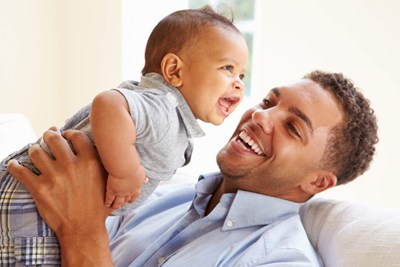
In these complex and challenging times, our children should be our priority. Surely society would object if genetic engineering were employed to create children born without an arm or a leg: it would be cruel to deliberately introduce children into the world with such disabilities. But to create children without a father, by the use of sperm banks, does not seem to incur any objection. Perhaps creating designer children with anonymous sperm donors is just symptomatic of our times. But dads matter: and they matter a great deal.
Studies abound that demonstrate that fathers play a vital, nurturing role in children’s development. These are not one-sided or partisan studies, but across-the-board. A piece in the left-wing Huffington Post, for example, points to research that:
...indicates that fathers are as important as mothers in their respective roles as caregivers, protectors, financial supporters, and most importantly, models for social and emotional behavior.
The article also notes that children of involved fathers tend to have:
[fewer] behavioral problems, and are somewhat inoculated against alcohol and drug abuse.
So why would we encourage women to create fatherless children by the use of sperm banks? In our constant search in America for independence, individual freedom and “self-expression,” women who choose to create a child deprived of a father are praised. I do not write here to denigrate women who make such a choice, but to champion the traditional family and the importance of both mother and father in the nurturing environment that best serves children. The evidence is obvious, and overwhelming. The foundational building block of every society is the family: our children, well-adjusted and educated, are our future. The health and well-being of children should be paramount to the personal desires of the adults who create them.
I do not propose that creating designer children should be illegal. But should we by law entitle children created by modern scientific advances to know who their biological father is? If so, at what age? By simply asking these questions we acknowledge the well-being of children as important, rather than negate their best interests as if they were mere chattels -- possessions -- of those who foster them.
In 1960, only 10% of American children were raised without fathers: today that figure exceeds 40%. Being connected with their biological fathers through their childhood enhances children’s safety, cognitive development, and decreases their likelihood of developing alcohol or drug abuse issues. (“The Importance of Fathers in the Healthy Development of Children,” Jeffrey Rosenberg and W. Bradford Wilcox, US Department of Health and Human Services, Office of Child Abuse and Neglect, 2006). This latter document was prepared because of an “increased recognition of the vital role that fathers play in all aspects of their children’s lives.”
It does little good to involve fathers in their kids’ lives at the age of majority. Yet informing artificially created children of their true fathers’ identities is “...something most sperm banks have resisted, fearing such openness would scare off potential donors. Even banks that do reveal dads’ identities will do so only when a child turns 18. (“‘Free Sperm Donors’ and the Women Who Want Them,” Newsweek, Tony Dokoupil, 10/2/11). It is ironic that the “fears” of commercial sperm banks trump the best interests of children: it is revealing that such fear stems from worry that potential donors would not ‘contribute.’ Fathers that would contribute sperm without time or nurturing are the opposite of good fathers. And in further irony, our society routinely expects fathers who unintentionally provide semen in unwanted pregnancies stand up to the plate and provide financial support for such children.
The referenced Newsweek article reveals yet more:
Hope, a single 43-year-old zoologist, echoes most FSDR [Free Sperm Donor Registry] searchers when she says, “I really want to have a child, and I want to give that child the best shot at having a good life, which is why I chose this route.”
But all studies show that Hope’s child has the best shot at having a good life if that child has an involved father, not an optimum DNA contributor. The Newsweek article does not even approach this glaring issue in its discussion, which makes me wonder whether our society has instead become hopeless.
Some will object to the constructive criticism broached here, on the grounds that the Hopes of the world are free to create children as they wish. But our society condemns corporal punishment of children, not just through journalism but by statute. Is it really worse to be spanked than to be bastardized? Many of us were spanked by our parents, but would still prefer to know them, and nurture lifelong relationships with them, rather than have been deprived of those relationships. Many of us would prefer to have been born without an arm or leg than without a father or mother. Every adopted, abandoned or orphaned child I ever met expressed a deep desire to know their biological parent(s). Maybe there should be a law about this….it could be called “Little Orphan Annie’s Law.” Because “Hope” most assuredly did not provide her child with “the best shot at having a good life.” Just the opposite.